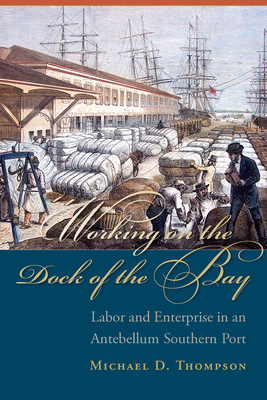Working on the Dock of the Bay: Labor and Enterprise in an Antebellum Southern Port

Working on the Dock of the Bay: Labor and Enterprise in an Antebellum Southern Port
An examination of the role and struggles of dockworkers--enslaved and free--in Charleston between the American Revolution and the Civil War
Working on the Dock of the Bay explores the history of waterfront labor and laborers--black and white, enslaved and free, native and immigrant--in Charleston, South Carolina, between the American Revolution and Civil War. Michael D. Thompson explains how a predominantly enslaved workforce laid the groundwork for the creation of a robust and effectual association of dockworkers, most of whom were black, shortly after emancipation. In revealing these wharf laborers' experiences, Thompson's book contextualizes the struggles of contemporary southern working people.
Like their postbellum and present-day counterparts, stevedores and draymen laboring on the wharves and levees of antebellum cities--whether in Charleston or New Orleans, New York or Boston, or elsewhere in the Atlantic World--were indispensable to the flow of commodities into and out of these ports. Despite their large numbers and the key role that waterfront workers played in these cities' premechanized, labor-intensive commercial economies, too little is known about who these laborers were and the work they performed.
Though scholars have explored the history of dockworkers in ports throughout the world, they have given little attention to waterfront laborers and dock work in the pre-Civil War American South or in any slave society. Aiming to remedy that deficiency, Thompson examines the complicated dynamics of race, class, and labor relations through the street-level experiences and perspectives of workingmen and sometimes workingwomen. Using this workers'-eye view of crucial events and developments, Working on the Dock of the Bay relocates waterfront workers and their activities from the margins of the past to the center of a new narrative, reframing their role from observers to critical actors in nineteenth-century American history. Organized topically, this study is rooted in primary source evidence including census, tax, court, and death records; city directories and ordinances; state statutes; wills; account books; newspapers; diaries; letters; and medical journals.
PRP: 314.04 Lei
Acesta este Pretul Recomandat de Producator. Pretul de vanzare al produsului este afisat mai jos.
282.64Lei
282.64Lei
314.04 LeiLivrare in 2-4 saptamani
Descrierea produsului
An examination of the role and struggles of dockworkers--enslaved and free--in Charleston between the American Revolution and the Civil War
Working on the Dock of the Bay explores the history of waterfront labor and laborers--black and white, enslaved and free, native and immigrant--in Charleston, South Carolina, between the American Revolution and Civil War. Michael D. Thompson explains how a predominantly enslaved workforce laid the groundwork for the creation of a robust and effectual association of dockworkers, most of whom were black, shortly after emancipation. In revealing these wharf laborers' experiences, Thompson's book contextualizes the struggles of contemporary southern working people.
Like their postbellum and present-day counterparts, stevedores and draymen laboring on the wharves and levees of antebellum cities--whether in Charleston or New Orleans, New York or Boston, or elsewhere in the Atlantic World--were indispensable to the flow of commodities into and out of these ports. Despite their large numbers and the key role that waterfront workers played in these cities' premechanized, labor-intensive commercial economies, too little is known about who these laborers were and the work they performed.
Though scholars have explored the history of dockworkers in ports throughout the world, they have given little attention to waterfront laborers and dock work in the pre-Civil War American South or in any slave society. Aiming to remedy that deficiency, Thompson examines the complicated dynamics of race, class, and labor relations through the street-level experiences and perspectives of workingmen and sometimes workingwomen. Using this workers'-eye view of crucial events and developments, Working on the Dock of the Bay relocates waterfront workers and their activities from the margins of the past to the center of a new narrative, reframing their role from observers to critical actors in nineteenth-century American history. Organized topically, this study is rooted in primary source evidence including census, tax, court, and death records; city directories and ordinances; state statutes; wills; account books; newspapers; diaries; letters; and medical journals.
Detaliile produsului








